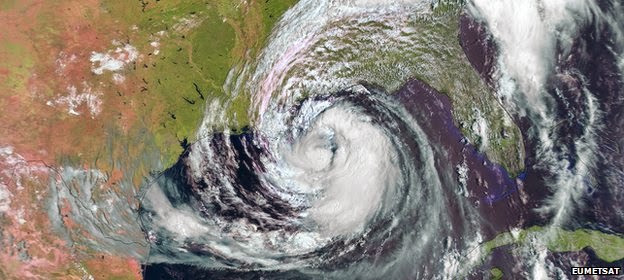The Metop weather satellites fly pole to pole, sampling conditions in the atmosphere
The competition to build Europe's next generation of polar-orbiting weather satellites has been won by EADS Airbus.
The big aerospace concern was declared the winner at the latest meeting of the European Space Agency's (ESA) Industrial Policy Committee (IPC).
A contract valued in the hundreds of millions of euros will be signed by ESA and EADS Airbus in due course.
Two of the Metop first generation satellites have so far been launched
The existing Metop series, as it is known, has a profound impact on the quality of weather forecasting.
The satellites' sensors gather profiles of atmospheric conditions, layer by layer.
Studies comparing all the different types of meteorological observations (including surface weather stations, balloons and aeroplanes, etc) have found Metop data to have the biggest single contribution to the accuracy of the 24-hour look ahead, at around 25%.
The improved forecasts of storms and other extreme events are estimated to be worth billions of euros annually in terms of lives saved and property damage avoided.
The Metop weather satellites looks down through the different layers in the atmosphere
Thursday's IPC decision is therefore a critically important one for the continent, by ensuring there is continuity of data when the existing series of Metop weather satellites is retired.
"Metop first generation has established itself as an essential series of satellites for weather forecasting. It gives the most detailed measurements from space for such purposes," explained ESA programme manager Graeme Mason.
The competition to build Europe's next generation of polar-orbiting weather satellites has been won by EADS Airbus.
The big aerospace concern was declared the winner at the latest meeting of the European Space Agency's (ESA) Industrial Policy Committee (IPC).
A contract valued in the hundreds of millions of euros will be signed by ESA and EADS Airbus in due course.
Two of the Metop first generation satellites have so far been launched
The existing Metop series, as it is known, has a profound impact on the quality of weather forecasting.
The satellites' sensors gather profiles of atmospheric conditions, layer by layer.
Studies comparing all the different types of meteorological observations (including surface weather stations, balloons and aeroplanes, etc) have found Metop data to have the biggest single contribution to the accuracy of the 24-hour look ahead, at around 25%.
The improved forecasts of storms and other extreme events are estimated to be worth billions of euros annually in terms of lives saved and property damage avoided.
The Metop weather satellites looks down through the different layers in the atmosphere
Thursday's IPC decision is therefore a critically important one for the continent, by ensuring there is continuity of data when the existing series of Metop weather satellites is retired.
"Metop first generation has established itself as an essential series of satellites for weather forecasting. It gives the most detailed measurements from space for such purposes," explained ESA programme manager Graeme Mason.









No comments:
Post a Comment